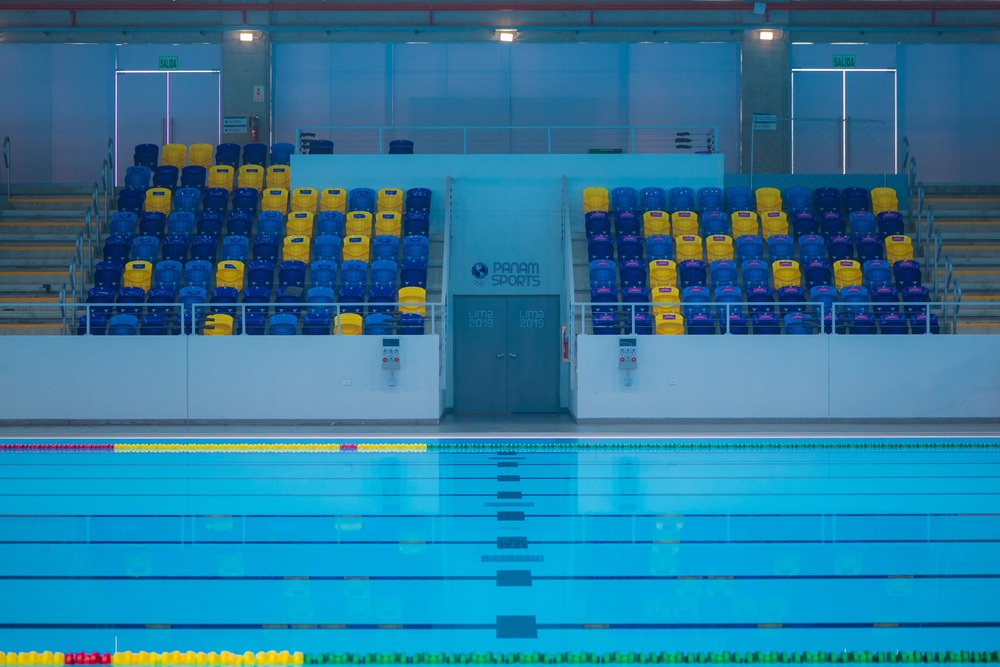Swimming pool filtration systems represent a key component for commercial installations to be able to craft a clean, safe and comfortable swimming experience. But picking the right system is not just about achieving pristine water, but also the capacity to do so efficiently and in line with regulations, while also reducing the pool’s energy and water use.
When it comes to commercial swimming pools, ensuring clean, safe, and crystal-clear water isn’t just a luxury, but a legal and operational necessity that is largely responsible for shaping the users’ experience. As such, choosing the right one among swimming pool filtration systems represents a key strategic decision that can trickle down into the way a pool is operated in the mid- to long term, as well as its eventual success or downfall.
In this guide, we plunge into these essential systems: their importance, types, functioning, and benefits, from the perspective of the needs of commercial environments such as hotels, resorts, public facilities, and aquatic centers.
Dive deeper with the eBook
Why swimming pool filtration systems are crucial in commercial settings
Commercial pools typically experience higher bather loads and more consistent use compared to residential pools. As a result, they accumulate debris, oils, bacteria, and contaminants much faster. In this context, implementing the right filtration system is not only key for removing physical impurities but also enhances the performance of chemical disinfection systems like chlorine or bromine.
On the contrary, facilities that fail to implement an effective filtration solution can experience a number of difficulties, including:
- Increased risk of waterborne illness for bathers
- Cloudy or unappealing water
- Violation of public health codes
- Frequent maintenance costs and pool downtime
As such, finding and implementing the right swimming pool filtration system represents a key move for achieving operational excellence and safety in commercial installations.

How swimming pool filtration systems work
A swimming pool filtration system is designed to recirculate pool water, removing suspended solids, organic matter, and microorganisms through a series of mechanical and chemical processes.
From the most innovative filtration systems to the most conventional, tried-and-tested solutions, the basic outline of components involved in this cycle include:
- Pump: drives water from the pool into the filtration system.
- Filter: removes physical particles from the water.
- Disinfection system: kills or inactivates harmful microorganisms.
- Return line: a system built for delivering clean, filtered water back to the pool.
In this ecosystem of components, it’s important to understand the filter is the main component in the mechanical filtration stage, so choosing the right type is essential for optimal performance. Below, we analyze the main types of available filters, including their pros and cons.
Types of filter for commercial swimming pool filtration systems
Several filtration technologies are used in commercial pool applications, each with its own advantages and ideal use cases:
1. Sand Filters
In sand filter technology, water is pushed through a bed of sand, which is able to trap debris and particles.
Pros:
- Low initial cost
- Simple maintenance
- Durable
Cons:
- Removes only particles down to 20–30 microns, thus leaving out smaller contaminants and microorganisms
- Requires regular backwashing, which involves a large use of water and thus important water waste
Best for: High-volume public pools and facilities with larger maintenance teams.
2. Cartridge Filters
In the case of cartridge filter systems, water flows through a pleated fabric cartridge that captures dirt and particles.
Pros:
- Able to filter particles as small as 10 microns
- Lower water waste compared to sand filters
- Compact footprint, so that they fit well in projects where space availability is an issue
Cons:
- More frequent cleaning required compared to other methods in this list
- Maintenance protocols must take into account that cartridges must be replaced periodically
Best for: Smaller commercial pools, therapy pools, or where water conservation is key.
3. Diatomaceous Earth (DE) Filters
This filtering technology uses fossilized diatoms (DE powder) coated on a filter grid to trap fine particles.
Pros:
- Capable of filtering particles down to 2–5 microns, offering superior water quality than the methods mentioned above
Cons:
- Higher maintenance requirements compared to other filtration systems
- DE powder can be hazardous if mishandled
- Not legal in all regions due to waste disposal regulations
Best for: High-end resorts, aquatic centers, or pools that require exceptional water clarity.
4. Regenerative Media Filters (RMF)
A high-efficiency alternative to DE filters, regenerative media filters stand out for reusing filter media through periodic “bumping” cycles that regenerate their filtering capacity.
Pros:
- Very fine filtration (1–3 microns), thus offering great water quality
- Up to 90% water savings compared to traditional filters
- Smaller equipment footprint
Cons:
- Higher upfront investment compared to other options in this list
- Requires specialized operational knowledge
Best for: LEED-certified facilities, eco-conscious hotels, modern aquatic centers that aim at offering crystal-clear water and top-tier bather experiences.

Benefits of choosing the right filtration system
For commercial installations, choosing and implementing an optimized swimming pool filtration system offers more than just clean water, but a series of benefits that extend into the long-term:
1. Enhanced swimmer safety
By removing pathogens and particulates efficiently, a good filter reduces the risk of Recreational Water Illnesses (RWIs) for bathers, including cryptosporidiosis and giardiasis.
2. Cost efficiency
Modern filtration systems reduce the need for excessive chemicals and frequent water replacements, lowering the related operational costs of these operations.
3. Regulatory compliance
Commercial pools must meet stringent water quality regulations. With the right filtration setup, they can ensure ongoing compliance with these while also avoiding costly penalties.
4. Improved equipment longevity
Clean, balanced water reduces corrosion and buildup on other pool infrastructure like heaters, pipes, and lighting. As such, investment in the right swimming pool filtration system translates into longer equipment lifecycles.
5. A move towards sustainability
Advanced systems such as RMFs and cartridge filters reduce backwash water waste, supporting sustainable pool management. At the same time, the fact that swimming pool filtration systems minimize the need for chemicals and water replacements also translates into improved sustainability.
Choosing the right swimming pool filtration system means picking the most aligned option with your project
When selecting the right swimming pool filtration system, commercial installations should take into account the decision is not just about upfront costs, but a strategic investment capable of enabling efficiency, brand reputation and bathers’ health.
The reason for this is straightforward: whether you’re managing a bustling public pool or a luxury resort spa, your filtration system is largely responsible for defining the quality and safety of your water, and thus for defining users’ overall experience and satisfaction.
In this context, the key to pick the right filtration system lies in being able to assess each pool’s unique usage profile, maintenance capacity, and sustainability goals.
The combination of these factors will inform taking the right decision: pools looking to achieve game-changing efficiency or adhere to green construction practices in aquatic facilities might opt for modern options like regenerative media filters; projects seeking tried-and-true filter technologies might prefer sand and cartridge filters; while a whole new category of filtration technologies opens up when looking at natural pools.
Whatever the choice, operators should keep in mind offering clean water isn’t a mere feature, but the foundation of every great, successful commercial pool.
Frequently asked questions about swimming pool filtration systems
How much does a swimming pool filtration system cost?
Prices for swimming pool filtration systems can vary greatly depending on the model’s components, the size and the specific filter that is employed. As such, prices can range from hundreds of dollars for smaller swimming pools to several thousands for the most modern commercial installations. Investment in the latter should consider the potential return on investment and efficiency gains that modern filter technologies are able to offer.
For more information and as a reference, you might take a look at Fluidra’s filtration product catalog, and get in touch to get specific equipment details and guidance from aquatic engineering experts on which system best fits your projects.
What are the two most common water filtration systems in pools?
All of the options mentioned above in this article represent popular swimming pool filtration systems today, although cartridge and sand filters can be mentioned as some of the most used.
However, options like regenerative media filters are quickly catching up today for offering enhanced benefits in the mid and long term in terms of operational costs, improved water quality and sustainability.
What type of pool filter is most effective?
When considering pool filter effectiveness, it’s important to look at the size of particles a certain type of filter is able to neutralize. As such, the most effective swimming pool filtration systems today include regenerative media filters (capable of filtering particles between 1–3 microns in size) followed by diatomaceous earth filters (which can tackle particles between 2 to 5 microns).
